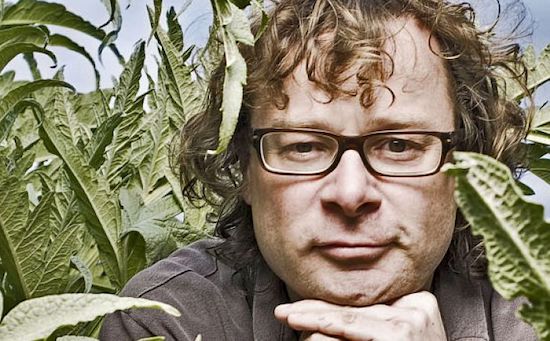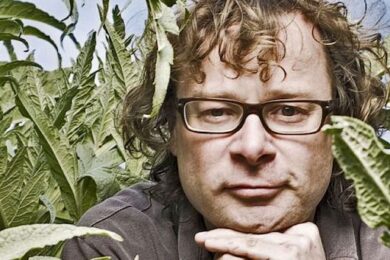Hugh Fearnley-Whittingstall at River Cottage
It was the optics that did it: beady, concupiscent eyes staring me down from above the bed of a friend I was benignly trying, unsuccessfully, to get off with. She loved Hugh Fearnley-Whittingstall tremulously, hence the Observer spread opener stuck above the headboard. I’d never seen the man, but there he was: tousled, green jumpered, needling my lack of initiative while holding what I think was a bull’s heart, viscera and blood dribbling between his fingers. The intersection of sex, death and earthy food? This was early-aughts Hugh in a paper nutshell and I was sold.
HFW, chef-turned-writer-turned-outré-food-broadcaster, was then the main protagonist in River Cottage. A kind of IRL Good Life, the initial three series of which ran on Channel 4 from 1999 ‘til 2001, it saw a youthful Hugh reject urban life to become a Dorset smallholder, living off the land and immersing himself in a community of hirsute poultry fanciers, bigoted gentry, convivial cider circles, allotment bikers and reticent lamping enthusiasts. It was fantastically engaging viewing.
While my friend’s interest in River Cottage was sexual – Hugh was possessed of an almost cosmic shagger energy – mine was more holistic, tied to my surroundings like a fish wrapped in gill net. The verdant and wild southwest corner of the Isle of Wight where I grew up was a hardwired topography; in which I drifted between woodland, megaliths, holloways and tumbledown smuggler’s coastline – once part of the same Jurassic shore as Hugh’s bit of Dorset – all the while feeling steamrolled at how beatific the reaches of one’s back garden could be.
It was ecstatic stuff for a teenager, but superficial. Blissfully unaware of the foibles of the working countryside, even in confected narrative River Cottage revealed it in multitudes. Watching the series delivered an education into living traditions – pastoral, weird, banal – that I’d idly missed discovering on my doorstep. (As well, it would transpire, as informing my nascent interests in folk music, folk horror, nature literature and food systems.) It was both romantic and beautifully unkempt: they were “all out the back, drinking cider, discussing butter”, but flecked in mud and oomska while they were at it.
It was clear then that River Cottage wasn’t simply airy lifestyle drivel. But the intervening years of re-watching in cyclical perpetuity have revealed a much stranger document. Those first series – Escape To River Cottage, Return To River Cottage and River Cottage Forever – comprise a truly underrated piece of gonzo weirdness, a crackers slice of pastoral literature writ corporeal in the guise of a benign cookery programme. A melding of John Seymour’s The Fat Of The Land and The Wicker Man, with Hugh’s Dorset – the holloways, dells and coastline around Netherbury, Bridport and Lyme Regis – rendered as a world of esoteric rites, ecstatic beauty and grubby pathos. A pre-Brexit vision of distant Albion, in which Hugh goes irreversibly native.
Hugh Fearnley-Whittingstall was born in 1965. His father Robert, an ad man, was the progeny of landed gentry; his mother Jane a well-known garden designer, writer and one-time secretary of The Who’s fanclub. His first taste of downshifting came at the age of six, when his parents moved from London to Gloucestershire, where, he said in his 2009 Desert Island Discs, he lived a bucolic existence “camping in the woods, racing snails and collecting birds’ eggs”.
After prep school, Eton. An aspiring punk, he blames the attempts to spike his then very straight hair with creating his now trademark mop. He became a 2-tone guy instead, for which Jane knitted him an elaborate mohair 2-tone jumper. After Oxford, he took to wildlife conservation, travelling to Africa but returning home eight months later, out of cash but filled with a passion for ecosystems. He found a job as a sous chef at the River Café, but was fired for being messy and inefficient. Food-writing stints for Punch, The Sunday Times, The Da…



